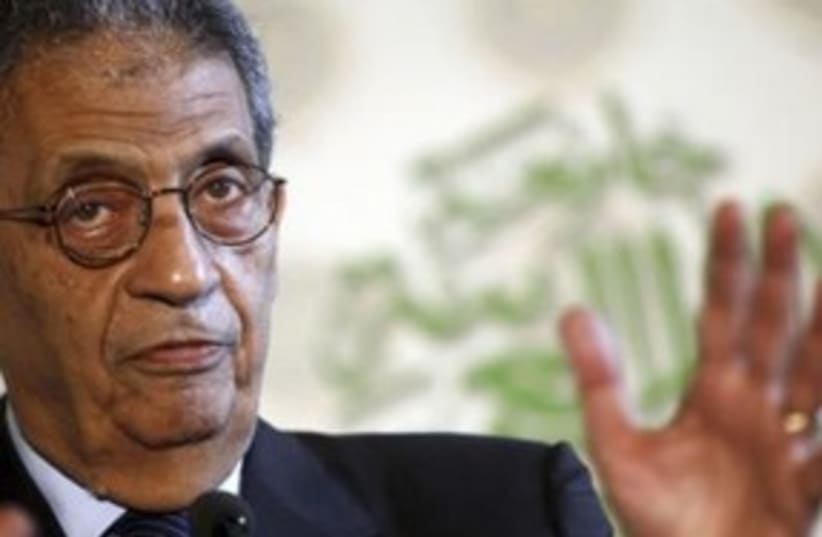RELATED:Palestinian state bid faces US veto at UN Security CouncilAbbas: It's illogical for US to block Palestinian statehoodHe was speaking in Doha, where Arab League member states were to meet later on Saturday to discuss Palestinian options in the wake of major policy speeches by US President Barack Obama and Prime Minister Binyamin Netanyahu.Moussa said a vision presented by Netanyahu in a speech to the US Congress this week had amounted to a series of "no's"."I believe that negotiations have become futile in light of all of these no's. What will you negotiate on?" Moussa said, referring to the Netanyahu speech which the Palestinians said put more obstacles in the path of the moribund peace process.Netanyahu said he was willing to make concessions for peace but repeated terms long rejected by the Palestinians, including an insistence that they recognise Israel as a Jewish state and accept Israel keeping settlement blocs in the occupied West Bank.Palestinian Authority President Mahmoud Abbas, in Doha for the meeting of the Arab League's peace process committee, said this week he would seek UN recognition for Palestinian statehood if there was no breakthrough in the peace process by September.The Palestinians currently have the status of UN observers without voting rights, but are hoping that at September's General Assembly they can persuade other nations to accept them as a sovereign member.Both Netanyahu and Obama have criticised the move, and although US opposition means the Palestinians have very little chance of success, the Israelis fear the maneuvering will leave them looking increasingly vulnerable on the diplomatic front.US-brokered talks between the Palestinians and Israel broke down last September in a dispute over continued Jewish settlement building in the West Bank.In a bid to break the deadlock, Obama said in a major policy speech last week that a future Palestinian state should be based on the borders as they existed on the eve of the 1967 Middle East War, with land swaps mutually agreed with Israel.Israel captured the West Bank, east Jerusalem and the Gaza Strip in that war.Netanyahu immediately rejected Obama's proposal saying it would leave Israel with "indefensible" borders. Abbas described the idea as "a foundation with which we can deal positively".
Arab League chief backs Palestinian UN statehood bid
Amr Moussa says "negotiations have become futile" in light of Netanyahu's speech to Congress which "amounted to a series of no's."

RELATED:Palestinian state bid faces US veto at UN Security CouncilAbbas: It's illogical for US to block Palestinian statehoodHe was speaking in Doha, where Arab League member states were to meet later on Saturday to discuss Palestinian options in the wake of major policy speeches by US President Barack Obama and Prime Minister Binyamin Netanyahu.Moussa said a vision presented by Netanyahu in a speech to the US Congress this week had amounted to a series of "no's"."I believe that negotiations have become futile in light of all of these no's. What will you negotiate on?" Moussa said, referring to the Netanyahu speech which the Palestinians said put more obstacles in the path of the moribund peace process.Netanyahu said he was willing to make concessions for peace but repeated terms long rejected by the Palestinians, including an insistence that they recognise Israel as a Jewish state and accept Israel keeping settlement blocs in the occupied West Bank.Palestinian Authority President Mahmoud Abbas, in Doha for the meeting of the Arab League's peace process committee, said this week he would seek UN recognition for Palestinian statehood if there was no breakthrough in the peace process by September.The Palestinians currently have the status of UN observers without voting rights, but are hoping that at September's General Assembly they can persuade other nations to accept them as a sovereign member.Both Netanyahu and Obama have criticised the move, and although US opposition means the Palestinians have very little chance of success, the Israelis fear the maneuvering will leave them looking increasingly vulnerable on the diplomatic front.US-brokered talks between the Palestinians and Israel broke down last September in a dispute over continued Jewish settlement building in the West Bank.In a bid to break the deadlock, Obama said in a major policy speech last week that a future Palestinian state should be based on the borders as they existed on the eve of the 1967 Middle East War, with land swaps mutually agreed with Israel.Israel captured the West Bank, east Jerusalem and the Gaza Strip in that war.Netanyahu immediately rejected Obama's proposal saying it would leave Israel with "indefensible" borders. Abbas described the idea as "a foundation with which we can deal positively".